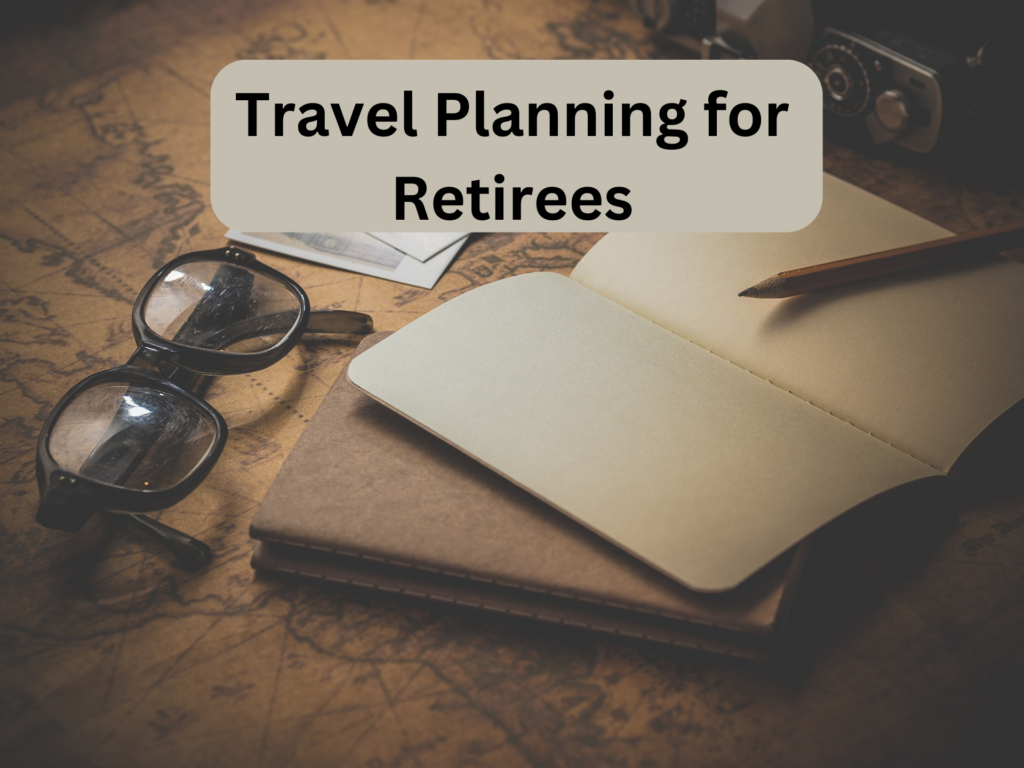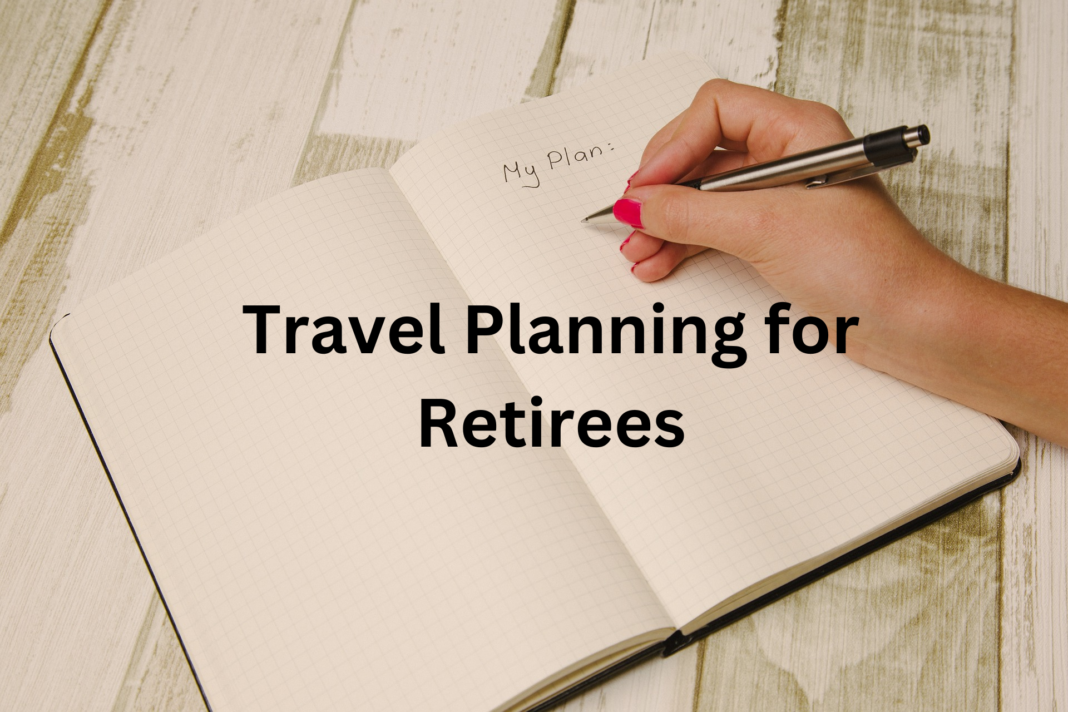Retirement is a new phase filled with new possibilities and time to travel the world. For many retirees, trips are high on the list of favourite activities because they allow them to create lifelong memories, learn about different cultures, and enjoy new experiences. On the flip side, planning trips tend to come with a special set of considerations and challenges facing retirees. This long manual will walk you through everything you should know in terms of travel planning for retirees so that your trips are safe, enjoyable, and precisely fitted to your needs.

Why Travel in Retirement?
Before going into how to plan, let’s explore why travelling is among the top activities retirees like to engage in:
- Freedom of Time: The work burdens are off your shoulders now, meaning you can go wherever and whenever you want.
- Personal Growth: It opens one to cultures, ideas, and experiences that enhance lifelong learning.
- Health Benefits: It can be good for physical and mental health due to the principle of active travel.
- Social Connections: Making new friends and reconnecting with old friends or family members.
- Fulfilling Dreams: Visiting those dream destinations you have always wanted.
Evaluating Your Travel Style and Preferences
Before you dive in and begin to plan for particular trips, take a little bit of time to reflect on your travel style and preferences:
Types of Travel Experiences
- Relaxation: Beach resorts, spa retreats, cruise ships.
- Cultural Immersion: City tours, historical sites, language learning.
- Adventure: Hiking, wildlife safaris, extreme sports.
- Educational: Workshops, courses, guided tours on specific interests.
- Volunteer Work: Combine travel with giving back to communities.
Pace and Activity Level
- Slow-paced: Visit fewer places and stay longer to soak in the atmosphere.
- Moderate: Spend equal amounts of time exploring and relaxing.
- Fast-paced: Travel to more places in less time.
Hotel Preference
- Hotels: Budget, Mid-range Luxury
- Vacation Rentals: apartment, houses
- RV or Camping
- Cruise Ships.
Knowing what you like will help you design your travel so that you will enjoy it as much as possible and feel comfortable.
Health and Safety Considerations
It is important that, as a retiree, travelling takes into account health and safety above everything else. The following are the key considerations:
Medical Arrangements
- Check-ups: Have a thorough check-up with your doctor before you embark on extensive travels.
- Vaccinations: Find out about and take necessary vaccinations about the places you intend to travel to.
- Medication: Bring enough medication to last you during your trip, and carry copies of your prescription.
- Summary Medical: Carry a short medical history as well as a list of present medications.
- Insurance: Take complete insurance that covers pre-existing conditions.
Choice of Destination
- Travel to destinations offering good health facilities.
- Know how climate and altitude may affect your health and take necessary precautions.
- Find out about the facilities available and their access.
Safety Tips
- Research: Familiarize yourself with local customs, laws, and possible safety concerns.
- Emergency Contacts: Make a list of important contacts, including family, doctors, and embassy information.
- Secure Valuables: Utilize hotel safes and be discreet with personal belongings.
- Stay Connected: Look into international phone plans or portable Wi-Fi devices.
Budgeting for Retirement Travel
Thoughtful financial planning will allow you to enjoy your travel without financial stress:
Evaluating Your Travel Budget
- Review Retirement Income: Know how much you’ll receive each month from pensions, savings, and investments.
- Calculate Travel Expenses: Look up average expenses for accommodations, food, transportation, and activities.
- Plan a Travel Budget: Build up a nest egg for travelling and set aside money regularly.
Save Money
- Travel Off-Season: Prices are lower, and there are fewer people.
- Use Rewards Programs: Utilize credit card points, airline miles, and hotel rewards.
- Look for Senior Discounts: Most of the sightseeing places to visit, transportation facilities, and lodging offer concessions to seniors.
- Home Swap: Negotiate a mutual deal to exchange homes with other travellers and save on accommodation costs.
- Group Tours: Join tours or travel groups for certain cost savings and social benefits, too.
Planning Your Itinerary
A perfect itinerary is the balancing act between wishes and real-life considerations:
Time Allocation
- Duration: Decide on how much time you want to travel. Do you want to go on one long trip or split your time into shorter ones?
- Pacing: Don’t overbook. Leave at least some days to rest and/or use as flex time.
Destination Research
- Climate: Find out the local seasons in order to determine the best times of year to go.
- Local Events: Look for festivals, holidays, or any other events that could enhance your travel experience.
- Accessibility: What are transportation options? How will you get around?
Booking Tips
flexibleness: Avail of options that allow cancellations or changes without extra cost.
package deals: It is often easier and sometimes cheaper to go with an all-inclusive package.
early bird specials: The earlier the booking, especially for popular destinations, the better the rates.
Transportation Considerations
The mode of transport chosen can make a huge difference in the travel experience. Here are a few to consider:
Air Travel
comfort: Consider upgrading to premium economy or business class if travelling long distances.
- Non-stop/ Direct Flights: Avail direct flights when available to avoid layovers and attendant stress.
- Assistance: Book airport assistance in advance where required – in the case of any mobility issues or otherwise.
Ground Transportation
- Car Rentals: Decide your comfort level when driving in foreign locations.
- Public Transportation: Research resources about the availability and access to public transportation.
- Guided Tours: Research and go on guided tours that will get you around without the hassle of arranging transportation yourself.
All-in-one option: Cruises offer accommodation, transportation, and activities in one package.
Variety: One can decide between river cruises, ocean liners, or even expedition ships, whichever fits their interests.
Accommodation Choices
Cruises
Correctly chosen accommodation will add much to the enjoyment of your travel:
Hotels and Resorts
Amenities: Choose those offering specific services to seniors, such as accessible rooms or at least on-site medical facilities.
Location: Centrally located ones are preferred for convenience in touring attractions.
Vacation Rentals
Home Comforts: Enjoy the additional space and the freedom to make your meals.
Local Experience: Use a neighbourhood house and make friends just like the locals do.
Senior-Specific Options
Retirement Communities: Some retirement communities incorporate travel programs or exchanges with other communities.
Elder Hostels: There are Elder Hostel programs that host special travel study programs for seniors.
Staying Active and Engaged
One of the best ways to stay active is with travel:
Physical Activities
Walking Tours: Take self-guided tours of cities or nature trails.
- Gentle Exercise: Consider places offering golf courses, swimming pools, or yoga classes.
Intellectual Stimulation
- Cultural Events: Experience cooking, art, or language lessons from the locals.
- Historical Places of Interest: Museums, monuments, and archaeological sites interest people about the cultures and histories of different places.
Social Interaction
- Group Tours: Avail specific tours designed for seniors or based on interest.
- Volunteering Opportunities: Undertake short-term volunteering at the place you’d be visiting.
Technology and Travel
Embracing technology can greatly help you enhance your travel experience in the following ways.
Useful Applications
- Translation Application: Break the language barrier through real-time translations.
- Navigation Application: Getting around places is pretty much simplified.
- Travel Planning Application: Keep bookings and itineraries at one place.
Staying Connected
- Smartphones: Find unlocked ones for using local SIM cards so you don’t bear excessive charges.
- Portable Wi-Fi Devices: Stay connected while avoiding open public Wi-Fi networks.
Digital Safety
- Password Protection: Use strong, unique passwords for all of your accounts.
- Virtual Private Network (VPN): Keep your information private by using a VPN when using unsecured public Wi-Fi.
Overcoming Travel Challenges
Discuss general issues to ensure a hitch-free journey:
Language Barrier
- Learn Key Phrases: Get familiar with some basic greetings and key phrases in the native language.
- Translation Tools: Utilize apps or pocket translators for more complex communications.
Mobility Issues
- Notify Service Providers: Advise airlines, hotels, and tour operators about special needs well in advance.
- Mobility Aids: Find out whether at your destination wheelchairs or mobility scooters are available.
Dietary Restrictions
- Research Local Cuisine: Have an idea of what is commonly used in the local cuisines.
- Be Able to Explain Dietary Needs: Be able to explain your food allergy or dietary need in the local language.
Sights to Treasure
Make long-lasting memories of your travel.
Photography Tips
Scamera investment: Consider ease of use and portability.
photography classes: Learn to capture better images before the trip.
Journaling
travel diary: From written to digital journals, record your experiences.
scrapbooking: Collect mementoes of your journey and put them in a physical keepsake of your journey.
Sharing Your Experiences
on social media: Share photos and stories with your friends and family back home.
- Travel Blog: Consider starting a blog to document your adventures and inspire others.
Conclusion
Accordingly, retirement travel can bring a world of opportunities for adventure, learning, and personal growth if the trip is well-planned according to one’s preferences and health needs, always keeping the budget in consideration. Remember, the secret of successful retirement travel is flexibility and attitude. Be open to new experiences, adventure, and stepping out of one’s comfort zone.
Whether you dream of lazy days spent on tropical beaches, explorations into ancient ruins, or experiences with vibrant cultures, it’s out there waiting for you. With proper planning and an open mind, your retirement years can be filled with unforgettable travel experiences that will be remembered and stories to be told for many years afterwards.
So pack your luggage and begin embarking on this journey. Get ready for writing that next exciting chapter of your life with travel. The rest of what happens in retirement is limited only to your imagination and willingness to explore. Happy travels!






